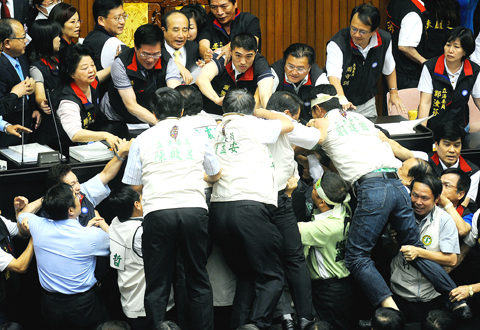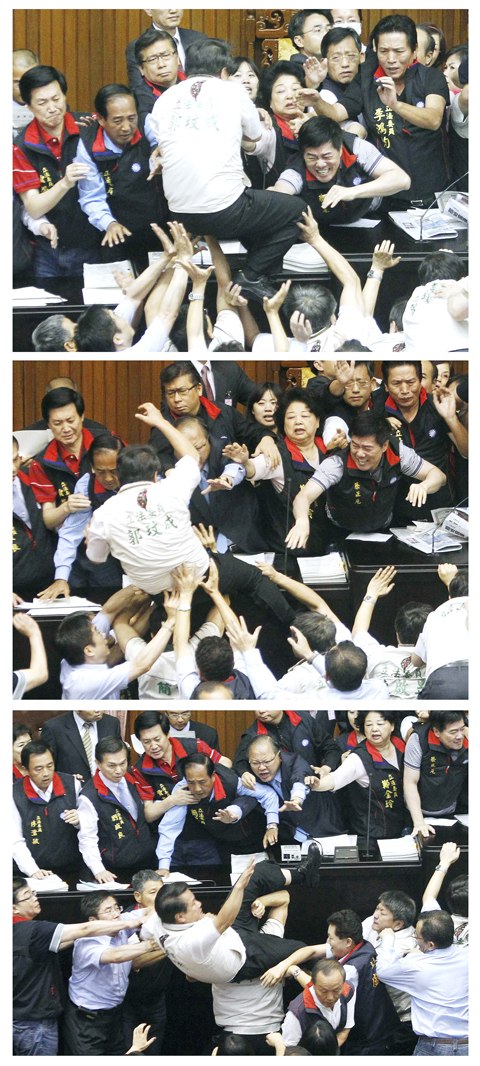Legislators threw objects, splashed water and kicked one another yesterday at the legislature, with two ending up in hospital after a brawl over disagreements on how the recently signed cross-strait Economic Cooperation Framework Agreement (ECFA) should be reviewed.
During the scuffle, Legislative Speaker Wang Jin-pyng (王金平), heavily guarded by Chinese Nationalist Party (KMT) legislators on the speaker’s podium, announced that the Legislative Yuan had approved the KMT caucus’ proposal to allow the ECFA and a cross-strait copyright protection agreement to skip preliminary review.

PHOTO: CHIEN, JUNG-FONG TAIPEI TIMES
Clashes had been expected as lawmakers interrupted their recess for the week-long debate, with the Democratic Progressive Party (DPP) caucus insisting the agreement should be reviewed article by article, a demand flatly rejected by the KMT caucus.

PHOTO: NICKY LOH, REUTERS
The ECFA was signed in the Chinese city of Chongqing on Tuesday last week. The KMT government has hailed the ECFA, saying it would bolster Taiwan’s economy, but the opposition claims it would jeopardize Taiwan’s sovereignty and make the country too economically dependent on China.
Yesterday’s legislative session degenerated into turmoil almost from the moment it began. Lawmakers from the two sides pushed and shoved around the -speaker’s dais, exchanging blows and -throwing objects at each other, including garbage cans and tea cups.
At one point, DPP lawmakers Liu Chien-kuo (劉建國) and Su Chen-ching (蘇震清) broke through a phalanx of KMT lawmakers surrounding the dais in an apparent effort to get to Wang, but were quickly overwhelmed and pushed down. DPP Legislator Kuo Wen-chen (郭玟成) also attempted to get to the dais to block the session, falling off the podium during a scuffle with KMT legislators.
As this was happening, KMT Legislator Wu Yu-sheng (吳育昇), who was standing next to Wang, was hit by what appears to have been a timer, leaving the corner of his right eye bleeding.
In the meantime, another group of KMT legislators trapped DPP Legislator Huang Sue-ying (黃淑英) in one corner while DPP legislators Kuan Bi-ling (管碧玲), Chen Ting-fei (陳亭妃) and others demanded that the ECFA be reviewed article by article.
Shortly afterwards, Kuo was sent to Taiwan University Hospital nearby, suffering a broken rib.
“It hurt a lot,” he said.
Wu was also taken to National Taiwan University and received eight stitches.
DPP Legislator Huang Wei-cher (黃偉哲) later admitted he threw the timer into the air. He apologized to Wu and said he was willing to foot his medical bill.
Premier Wu Den-yih (吳敦義) also visited Wu Yu-sheng and Kuo at hospital. The premier told -media that while he was happy to see lawmakers display earnestness in reviewing the ECFA, he worried that when things got out of hand, lawmakers could get injured.
After the provisional session ended, KMT Legislator Hsieh Kuo-liang (謝國樑) accused DPP legislators of scratching and biting his arm while KMT -legislator Yang Chiung-ying (楊瓊瓔) and Kuo Su-chun (郭素春) held DPP Chairperson Tsai Ing-wen (蔡英文) responsible for the clashes.
The DPP caucus issued its own accusations, saying Wang had lost his impartiality as legislative speaker.
DPP Secretary-General Lee Chun-yee (李俊毅) also questioned yesterday’s procedure, saying that Wang did not call for a vote when the DPP lawmakers voiced their opposition to the KMT caucus’ proposal on the legislative floor.
The KMT caucus also resolved not to invite the premier to brief the legislature and answer lawmakers’ questions regarding the ECFA on the legislative floor.
Earlier yesterday, the KMT-dominated legislature also voted down a proposal by the DPP caucus to pass a draft bill regulating the process and content of cross-strait deals, establish a task force within the legislature to play an active role in signing cross-strait agreements and set up a committee to probe cross-strait agreements if necessary.
"Today is the darkest day in the [history] of the Legislative Yuan,” Lee said in the legislature.
“The KMT not only killed the public referendum proposals [on the ECFA], but also denied the legislature its right to review the agreement article by article,” the DPP secretary-general said.
The legislature agreed to call a provisional session yesterday afternoon through Wednesday next week.
The agenda of the session includes the ECFA, a cross-strait copyright protection deal, a proposed amendment to the Disaster Prevention and Protection Act (災害防救法) and a controversial draft act on rural renewal that has already been criticized as being designed simply to garner support for the KMT.
At a separate setting later yesterday, KMT Secretary-General King Pu-tsung (金溥聰) accused the DPP of acting as a “minority bully” against the KMT during deliberations on the ECFA.
King urged the opposition not to oppose the economic pact “irrationally.”
“Democracy runs according to majority rule and our legislators were elected by voters. The DPP’s violent opposition is tantamount to bullying,” King said of the chaos in the legislature.
King said the DPP’s local government heads, including Kao-hsiung Mayor Chen Chu (陳菊), Tainan County Commissioner Su Huan-chih (蘇煥智) and Yunlin County Commissioner Su Chih-fen (蘇治芬) had all acknowledged the benefits of the ECFA and that the DPP should not deny the potential benefits of the pact.
“The ECFA has its pros and cons, and for Taiwan, the ECFA will definitely bring more benefits than disadvantages,” he said.
“We welcome the DPP to oversee the pact, but it should not act against it for no reason,” he said.
KMT Spokesman Su Jun-pin (蘇俊賓) said the party respected the DPP’s right to deliberate in the legislature, but added that the KMT would continue to demand the pact be reviewed as a whole rather than going through it clause by clause.
The DPP insists it wants to screen the articles in the ECFA one by one to expose what it calls potential disadvantages.
As an opposition party, the DPP has the responsibility to safeguard Taiwan’s interests and to prevent the KMT from locking Taiwan irreversibly with China, newly elected DPP caucus whip Ker Chien-ming (柯建銘) said.
The KMT caucus’ insistence that the ECFA be reviewed and passed in its entirety is an indication that the party and the government are not being transparent about the political concessions they have made to China in the pact, Ker said.
ADDITIONAL REPORTING BY CNA AND SHIH HSIU-CHUAN

TRAGEDY STRIKES TAIPEI: The suspect died after falling off a building after he threw smoke grenades into Taipei Main Station and went on a killing spree in Zhongshan A 27-year-old suspect allegedly threw smoke grenades in Taipei Main Station and then proceeded to Zhongshan MRT Station in a random killing spree that resulted in the death of the suspect and two other civilians, and seven injured, including one in critical condition, as of press time last night. The suspect, identified as a man surnamed Chang Wen (張文), allegedly began the attack at Taipei Main Station, the Taipei Fire Department said, adding that it received a report at 5:24pm that smoke grenades had been thrown in the station. One man in his 50s was rushed to hospital after a cardiac arrest

PUBLIC SAFETY: The premier said that security would be tightened in transport hubs, while President Lai commended the public for their bravery The government is to deploy more police, including rapid response units, in crowded public areas to ensure a swift response to any threats, President William Lai (賴清德) said yesterday after a knife attack killed three people and injured 11 in Taipei the previous day. Lai made the remarks following a briefing by the National Police Agency on the progress of the investigation, saying that the attack underscored the importance of cooperation in public security between the central and local governments. The attack unfolded in the early evening on Friday around Taipei Main Station’s M7 exit and later near the Taipei MRT’s Zhongshan

ON ALERT: Taiwan’s partners would issue warnings if China attempted to use Interpol to target Taiwanese, and the global body has mechanisms to prevent it, an official said China has stationed two to four people specializing in Taiwan affairs at its embassies in several democratic countries to monitor and harass Taiwanese, actions that the host nations would not tolerate, National Security Bureau (NSB) Director-General Tsai Ming-yen (蔡明彥) said yesterday. Tsai made the comments at a meeting of the legislature’s Foreign Affairs and National Defense Committee, which asked him and Minister of National Defense Wellington Koo (顧立雄) to report on potential conflicts in the Taiwan Strait and military preparedness. Democratic Progressive Party (DPP) Legislator Michelle Lin (林楚茵) expressed concern that Beijing has posted personnel from China’s Taiwan Affairs Office to its

SAFETY FIRST: Double the number of police were deployed at the Taipei Marathon, while other cities released plans to bolster public event safety Authorities across Taiwan have stepped up security measures ahead of Christmas and New Year events, following a knife and smoke bomb attack in Taipei on Friday that left four people dead and 11 injured. In a bid to prevent potential copycat incidents, police deployments have been expanded for large gatherings, transport hubs, and other crowded public spaces, according to official statements from police and city authorities. Taipei Mayor Chiang Wan-an (蔣萬安) said the city has “comprehensively raised security readiness” in crowded areas, increased police deployments with armed officers, and intensified patrols during weekends and nighttime hours. For large-scale events, security checkpoints and explosives